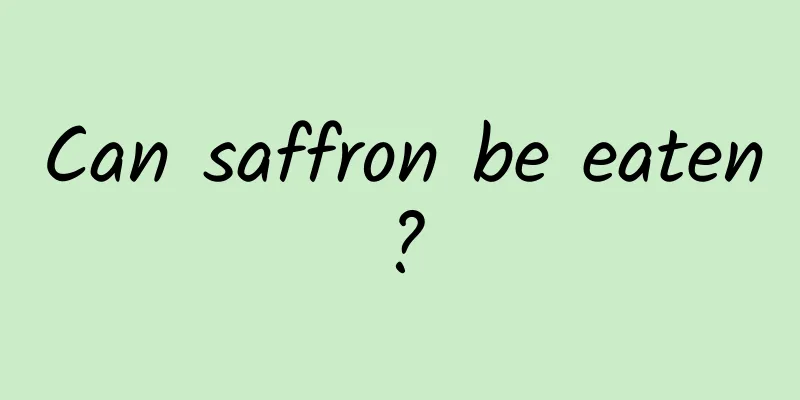Can saffron be eaten?

|
As we all know, saffron is an excellent product with the effects of promoting blood circulation, removing blood stasis, clearing away heat and detoxifying, and it is very effective in treating symptoms of traumatic injuries. When eating saffron, many people like to combine saffron with other ingredients to prepare dishes to enrich the taste and nutritional value of food, but many people also use saffron to make tea, which is simpler and more convenient and retains its original flavor. So can saffron be eaten directly? Can saffron be eaten directly? It is inevitable that we will have sprains and bruises during production or labor. In fact, general sprains and bruises do not need to be treated in the hospital. You only need to use some saffron and then massage to effectively improve the pain and bruises. Saffron can be eaten directly. How to Eat Saffron 1. The general way to eat is to take 5-8 filaments each time and soak them in water. Drink for three days and stop for one day or every other day. Soak 6 to 8 filaments in water and drink 3 or 4 cups of water every day. Use it regularly for prevention and health care. It can play a good role in beauty and health care. Such a small amount of long-term use has mild medicinal properties and good effects, but persistence is the key. 2. Use alone: You can directly boil the saffron to take the juice, or you can use boiling water to brew saffron, and brew it repeatedly for 4 times; for those who drink alcohol, you can soak 4 grams of saffron in 1 catty of wine for half a month and take it daily. 3. How to make saffron rice: Wash the rice first, add 3-5 saffron, 3-5 kadama, and some water, cook until done, add fried cashews, cheese, salt, and shredded coconut and mix well. 4. The dosage is generally 3-9 grams. The effects of saffron 1. Effects on liver and gallbladder Saffron has a choleretic effect, and crocetin can lower cholesterol and increase fat metabolism. It can be used in combination with traditional Chinese medicines such as hawthorn, cassia, and oriental medicine to treat fatty liver. Saffron improves microcirculation, promotes the secretion and excretion of bile, thereby reducing abnormally elevated globulin and total bilirubin, and can be used to treat cirrhosis after chronic viral hepatitis. Crocetin has a chemopreventive effect on early acute liver damage caused by toxic substances, and is expected to be used in the treatment of chronic cholecystitis. 2. Effects on the circulatory system Saffron extract has an excitatory effect on breathing. Under normal pressure and hypoxia conditions, it can enhance the oxygen metabolism function in cells, improve the heart's tolerance to hypoxia, and to a certain extent reduce the damage to myocardial cells caused by strenuous exercise, thus having a certain protective effect on the heart. 3. Immunomodulatory effect Clinically, saffron is used to treat a variety of chronic diseases in the human body. Through its effects of promoting blood circulation and removing blood stasis, antibacterial and anti-inflammatory, it enhances the body's endurance and lymphocyte proliferation response, thereby improving the body's cellular immunity and humoral immunity, and plays a role in adjusting the operation of the human body's qi and balancing the body's yin and yang. 4. Anti-tumor effect Modern research has found that saffron preparations have significant anti-cancer capabilities. 5. Effects on the kidneys It is believed that the pathogenesis of glomerulonephritis is closely related to platelets and the inflammatory mediators they release. Saffron has achieved significant therapeutic effects in interfering with animal models of nephritis. Saffron can keep renal capillaries unobstructed, increase renal blood flow, and promote the repair of inflammatory damage. It is best to take saffron to replenish blood and qi. Although there are side effects, as long as it is not excessive, it does not matter much. At the same time, it has a good effect on irregular menstruation, endocrine disorders, etc., and it also has anti-aging and beauty effects. 6. Effects on the blood system The hot water extract of saffron has a significant anticoagulant effect. It can prolong the plasma prothrombin time and activated partial thromboplastin time (aPTT), inhibit ADP and collagen-induced platelet aggregation, and accelerate the fibrinolytic effect of urokinase and plasmin. The synthetic matrix decomposition method was used to study the concentration-dependent inhibition of saffron extract on the decomposition of the cyan-colored synthetic matrix (PS-944) caused by plasmin, with an IC50 of 24.5 mg/ml, and the inhibition form was non-competitive inhibition. Note: Saffron is a good medicine for promoting blood circulation and removing blood stasis, so it is forbidden to use during menstruation and for pregnant women. |
>>: Can pregnant women drink saffron?
Recommend
Why is the meat of mantis shrimp so delicious? It turns out that it is trained through "boxing"!
Review expert: Liang Yujun, Associate Professor, ...
The efficacy and function of the old woman's needlework
Many people know that the old woman's needlew...
Ordering takeout, loving tea drinking, raising pets... let's experience the happiness of people in the Song Dynasty together!
What was the Song Dynasty like? In history textbo...
Why do some people hate cilantro, while others love it? Here's the reason!
Coriander is very familiar to everyone. As a plan...
Behind the successful "heart transplant" of a one-year-old child: What is the true status of global transplant research?
Heart transplantation has always been considered ...
Attention! What you are drinking may be Aspergillus flavus, not golden camellia tea!
China is not only a major tea producer, but also ...
Medicinal value of Dendrobium
Dendrobium has many medicinal values, but most pe...
The efficacy and function of sword bark mushroom
As the pressure of modern life increases, more an...
The world's first and only case! Ael subtype blood type discovered in Xiamen, rarer than "panda blood"
recently A man in Xiamen applied for blood typing...
This natural secret is called "the original appearance of the world"
Hello everyone, I am Chen Shiying, a nature conse...
Can I not wash my face when the weather is cold? The answer is unexpected →
The weather is getting colder, and some people ma...
What are the effects and functions of Artemisia capillaris
We rarely see Artemisia capillaris on the dining ...
What are the benefits of ginseng tea?
Ginseng is a common medicinal herb in Asia. Both ...
Does eating burnt food increase the risk of cancer? Developing these five cooking habits can save your life
This article was reviewed by Pa Li Ze, chief phys...









